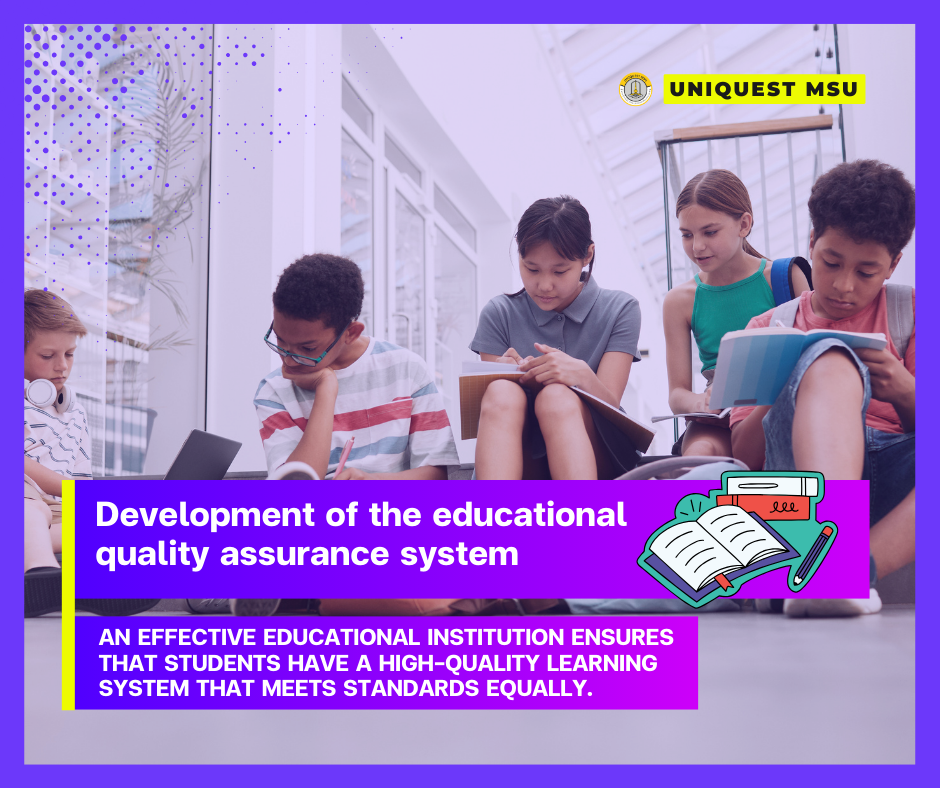
Development of the Educational Quality Assurance System According to the Ministerial Regulation on Educational Quality Assurance
Currently, Thailand’s educational system has seen significant development, with the government supporting the expansion of opportunities to ensure that Thai children have access to education in all areas. However, along with expanding educational opportunities, educational institutions must also develop quality to ensure that Thailand’s education system meets consistent standards across all regions. This has led to the establishment of an educational quality assurance system.
Educational quality assurance is an operation designed to assure students, parents, communities, and society that the educational institution’s operations are effective, providing a quality learning system that meets equitable standards.
The educational quality assurance system comprises:
1. Educational Quality Development
2. Monitoring and Supervision to Control Educational Quality
3. Educational Quality Assessment
Educational quality assurance thus refers to the management and implementation of activities to continuously improve the quality of learners, providing confidence to the direct recipients of educational services—students and parents—and indirect recipients, including community members, society, and enterprises.
Importance of Educational Quality Assurance
– To provide the public with reliable information about educational quality, fostering societal trust.
– To prevent substandard education, ensuring equitable access to quality educational services.
– To direct those responsible for education management toward quality and standard-based management, leading to the tangible and continuous development of a quality population.
The educational quality assurance system and process include two systems: 1. Internal Quality Assurance (IQA) and 2. External Quality Assurance (EQA).
Internal Quality Assurance (IQA)
After an educational institution conducts an internal quality assessment according to its internal educational standards and uses the assessment results as a basis for planning, setting targets, and continuously improving quality management practices, it should consider the following key principles and processes:
1. Principle of Participation: Everyone in the educational institution works together to improve its educational quality.
2. Principle of Accountability: The institution is responsible for explaining its educational quality to the public.
3. Principle of Quality Assurance: Quality assurance is the responsibility of everyone in the educational institution, including administrators, teachers, and support staff. They must all take part in each step of the internal quality assurance process, utilizing the PDCA cycle.
The PDCA cycle consists of:
– Planning (Plan): Setting goals and objectives.
– Implementation and Monitoring (Do & Check): Following the plan, monitoring, and evaluating quality during the process.
– Improvement (Act): Using the evaluation results as a standard for further development or raising the quality level.
Internal Quality Assurance (IQA) Process
1. Establishing Educational Standards: Educational institutions set standards related to attributes, quality, benchmarks, and success targets.
2. Development Towards Set Standards: Institutions create written plans that outline goals and developmental guidelines over a specified period.
Roles and Responsibilities of Teachers in Internal Quality Assurance
Preparation: Teachers must prepare themselves by understanding the principles, methods, and steps of internal evaluation and developing a positive attitude towards internal evaluation.
Cooperation: Teachers should cooperate by providing information to the internal evaluation committee.
Participation: Teachers should participate in activities as committee members when appointed, such as considering the creation of various data collection tools, conducting surveys, analyzing data, and summarizing evaluations.
Involvement: Teachers should be involved in setting objectives, standards, and indicators for various aspects of evaluation, determining criteria for standards and indicators.
Systematic Execution: Teachers should perform their regular duties systematically according to educational standards, such as curriculum development, creating student-centered lesson plans, preparing appropriate content, making effective teaching aids, conducting activities that encourage self-study, using diverse assessment methods, and continuously improving based on evaluation results.
External Quality Assurance (EQA)
External Quality Assurance involves evaluating educational management, monitoring, and inspecting the quality and standards of educational institutions. This is the role of the Office for National Education Standards and Quality Assessment (ONESQA), which provides feedback to enhance the educational quality, strengthening institutions, and building societal trust.
New Policies for External Quality Assessment
The new principles and assessment models include:
Expert Judgment: Evaluations conducted by experts.
Holistic Assessment: Comprehensive evaluations considering all aspects.
Evidence-Based Assessment: Evaluations based on empirical evidence.
The new assessments focus on developmental evaluations where experts provide guidance and support, rather than determining levels or pass/fail statuses, and do not certify the quality of educational institutions.
Components of the Evaluation Team
The evaluation team consists of representatives from three groups:
1. Experts from the Office for National Education Standards and Quality Assessment (ONESQA).
2. Experts from the respective agencies.
3. Independent school administrators.
The new evaluation process emphasizes the skills, experience, and expertise of the evaluators.
Benefits of Educational Quality Assurance
Trust in Educational Standards: Builds confidence in educational standards among service users and parents.
Professionalism and Transparency: Promotes systematic, transparent, and quality-focused work, allowing continuous development for teachers and students.
Efficient Administration: Enables administrators to use their knowledge and abilities effectively in a systematic and transparent manner, improving the quality of educational institutions.
Appropriate Governance: Ensures that educational committee members work according to their roles, contributing to institutional development and the quality of education alongside administrators and teachers.
Quality Institutions: Leads to educational institutions that develop youth with the potential to improve themselves, their organizations, communities, and the nation.
UNIQUEST Mahasarakham University recognizes the importance of developing the knowledge of educational personnel within local administrative organizations. Therefore, it has organized a training program titled “Enhancing the Efficiency of Education Management in Schools/Child Development Centers under Local Administrative Organizations through an Educational Quality Assurance System and Curriculum Development, Digital Technology Application, and Innovation for Digital Literacy Skills Development towards Educational Quality Assurance and Performance Agreement (PA) Evaluation.”
For more information, please contact:
Line ID: @umsu (please include the @)
Website: uniquest.msu.ac.th
Phone: 09-5197-9851, 09-5618-7887, 06-2545-6746, 08-7216-4889, 09-4538-4858
Last Updated on 09-08-2024 by Tanakrit Lawan




